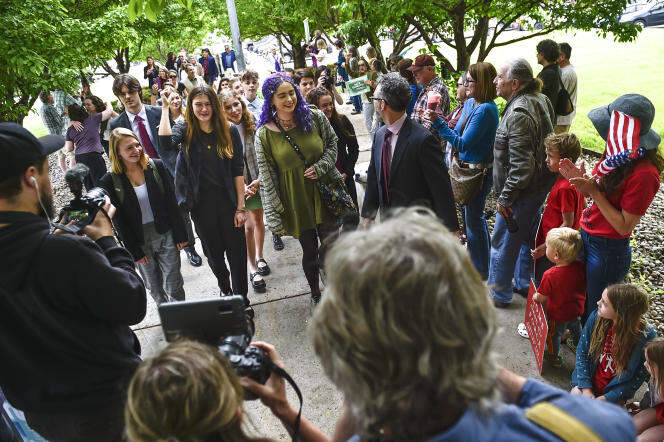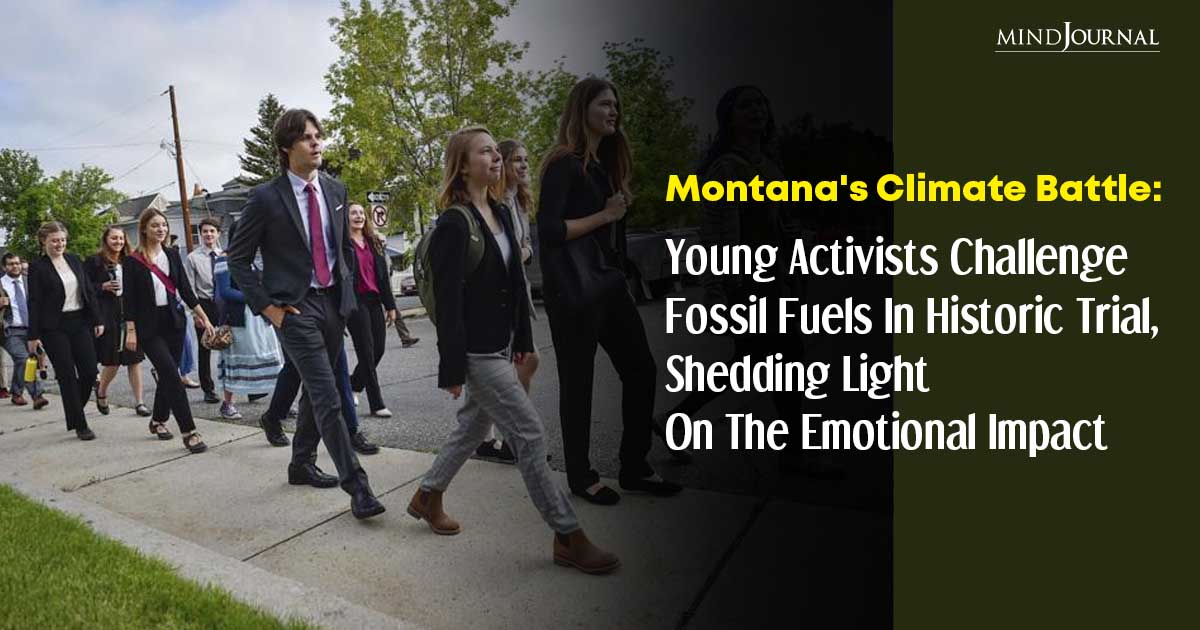In a landmark youth climate trial in Montana that commenced on Monday, a group of young people is challenging their state’s support for fossil fuels.
They argue that it is not only devastating pristine environments but also robbing them of a healthy future.
The case, which has been in the making for over a decade, marks the first of several similar challenges across the country, aiming to exert pressure on policymakers to take immediate action on emissions.

Related Deteriorating Air Quality In NYC As Canadian Wildfire Smoke Engulfs The City
Landmark Youth Climate Trial In Montana, USA Challenges State’s Fossil Fuel Support
Sixteen young residents, ranging in age from 5 to 22, contend that Montana’s government has failed to uphold its constitutional duty of preserving a clean and healthful environment for present and future generations.
Their case highlights the detrimental impacts of climate change on the state, including droughts, wildfires, heatwaves, and floods that have endangered livelihoods, disrupted cultural traditions, and threatened access to clean water and outdoor activities.
Montana’s state leaders have vehemently opposed the accusations, dismissing the trial as a show and labeling it a “gross injustice.”
Assistant Attorney General Michael Russell argued during the opening statements that Montana’s emissions were inconsequential in the global context of climate change, relegating the state to the role of a mere spectator.
Over the two-week trial in Lewis and Clark County, young witnesses will share their firsthand experiences of dealing with climate change, supplemented by expert testimony from climate scientists.
The plaintiffs aim to persuade Judge Kathy Seeley to declare the state’s support for the fossil fuel industry as unconstitutional, a ruling that could pressure Montana and other states to address emissions and consider climate impacts in project approvals.
Related Why Are There Thousands Of Dead Fish On Texas Gulf Coast Beach?
Environmental Impact On Health
Montana is already grappling with the effects of a warming climate, including the shrinking of glaciers at Glacier National Park and an extended wildfire season that endangers the state’s cherished outdoor pastimes.
The young plaintiffs argue that the state’s inaction not only jeopardizes their future but also undermines Montana’s treasured landscapes and economic prosperity.
The consequences of environmental change extend beyond ecological disruptions and have profound implications for physical and mental health.
Extreme weather events increase the risk of injuries, displacement, and the spread of infectious diseases.
Heatwaves, floods, and wildfires pose immediate threats to individuals and communities, exacerbating respiratory issues, cardiovascular problems, and mental distress.
Climate change also disrupts access to clean water, compromising hydration, sanitation, and food security, further endangering health.
The ecological disruptions caused by climate change can have profound psychological impacts. Loss of homes, livelihoods, and treasured landscapes can evoke feelings of grief, anxiety, and depression.
The uncertainty and unpredictability of changing weather patterns contribute to heightened stress levels and emotional strain.
Recognizing the interconnectedness of environmental and human well-being emphasizes the urgency of addressing climate change for the sake of public health.
Montana, known as the “Treasure State,” has a historical association with the mining industry. However, it also prides itself on unspoiled landscapes and clear lakes, earning the moniker “The Last Best Place.”
In 1972, the state added language to its Constitution, affirming the right to a clean and healthful environment in response to growing concerns about safeguarding these assets.
This legal battle serves as a critical test of whether Montana will live up to its constitutional commitment and prioritize the well-being of its citizens.
Scientific Evidence And Resistance
As the trial began, scientific evidence highlighting the rise of carbon dioxide levels in the atmosphere and its direct link to fossil fuels was presented.
The state attempted to object to the introduction of the latest climate assessment report from the Intergovernmental Panel on Climate Change, but the judge ultimately allowed it as evidence, recognizing its significance in understanding the urgency of the situation.
State leaders in Montana have consistently denied the scientific consensus on the impact of fossil fuel emissions on climate change.
However, Our Children’s Trust, the environmental nonprofit supporting the Montana lawsuit, has persistently pursued legal action nationwide, with several cases still pending.
A recent preliminary victory in Oregon, where a judge ruled that a youth case against the federal government could proceed to trial, offers hope for progress.
As the landmark youth climate trial in Montana unfolds, the world watches with anticipation, recognizing its potential to spur action on climate change.
The testimonies of these young plaintiffs, coupled with scientific evidence, highlight the urgent need for environmental responsibility and policy changes.
Moreover, the connection between environmental change and physical and mental health underscores the far-reaching implications of climate change.








Leave a Reply